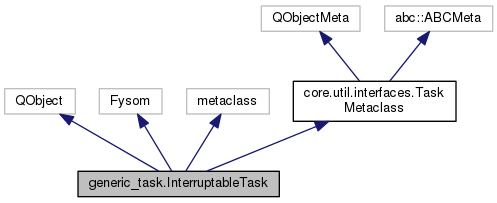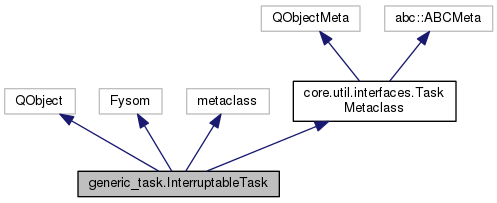This class represents a task in a module that can be safely executed by checking preconditions and pausing other tasks that are being executed as well. More...


Public Member Functions | |
| def | __init__ (self, name, runner, references, config, kwargs) |
| Create an Interruptable task. More... | |
| def | log (self) |
| Returns a logger object. | |
| def | onchangestate (self, e) |
| Fysom callback for state transition. More... | |
| def | checkStartPrerequisites (self) |
| Check whether this task can be started by checking if all tasks to be paused are either stopped or can be paused. More... | |
| def | checkExtraStartPrerequisites (self) |
| If your task has extra prerequisites that are not covered by checking if a certain task can be paused, overwrite this function when sub-classing. More... | |
| def | checkPausePrerequisites (self) |
| Check if task is allowed to pause based on external state. More... | |
| def | checkExtraPausePrerequisites (self) |
| If yout task has prerequisites for pausing, overwrite this function when subclassing and put the check here. More... | |
| def | canPause (self) |
| Check if task can pause based on its own state only. | |
| def | startTask (self) |
| Implement the operation to start your task here. | |
| def | runTaskStep (self) |
| Implement one work step of your task here. More... | |
| def | pauseTask (self) |
| Implement the operations necessary to pause your task here. | |
| def | resumeTask (self) |
| Implement the operations necessary to resume your task from being paused here. | |
| def | cleanupTask (self) |
| If your task leaves behind any undesired state, take care to remove it in this function. More... | |
Public Attributes | |
| lock | |
| name | |
| interruptable | |
| success | |
| runner | |
| ref | |
| config | |
| result | |
Detailed Description
This class represents a task in a module that can be safely executed by checking preconditions and pausing other tasks that are being executed as well.
The task can also be paused, given that the preconditions for pausing are met.
State diagram for InterruptableTask:
stopped -> starting --------—> running ------—> finishing -* ^ | _______| ^_________ | |<------—* v | v | pausing -> paused -> resuming | | | | | ^ v v | |----------—<-----—|-------—<------—|-----—<----—
Each state has a transition state that allow for checks, synchronizatuion and for parts of the task to influence its own execution via signals. This also allows the TaskRunner to be informed about what the task is doing and ensuring that a task is executed in the correct thread.
Constructor & Destructor Documentation
◆ __init__()
| def generic_task.InterruptableTask.__init__ | ( | self, | |
| name, | |||
| runner, | |||
| references, | |||
| config, | |||
| kwargs | |||
| ) |
Create an Interruptable task.
- Parameters
-
str name: unique task name object runner: reference to the TaskRunner managing this task dict references: a dictionary of all required modules dict config: configuration dictionary
Member Function Documentation
◆ checkExtraPausePrerequisites()
| def generic_task.InterruptableTask.checkExtraPausePrerequisites | ( | self | ) |
If yout task has prerequisites for pausing, overwrite this function when subclassing and put the check here.
- Returns
- bool: return True if task can be paused right now, False otherwise
◆ checkExtraStartPrerequisites()
| def generic_task.InterruptableTask.checkExtraStartPrerequisites | ( | self | ) |
If your task has extra prerequisites that are not covered by checking if a certain task can be paused, overwrite this function when sub-classing.
- Returns
- bool: return True if task can be started, False otherwise
◆ checkPausePrerequisites()
| def generic_task.InterruptableTask.checkPausePrerequisites | ( | self | ) |
Check if task is allowed to pause based on external state.
◆ checkStartPrerequisites()
| def generic_task.InterruptableTask.checkStartPrerequisites | ( | self | ) |
Check whether this task can be started by checking if all tasks to be paused are either stopped or can be paused.
Also check custom prerequisites.
- Returns
- bool: True if task can be stated, False otherwise
◆ cleanupTask()
| def generic_task.InterruptableTask.cleanupTask | ( | self | ) |
If your task leaves behind any undesired state, take care to remove it in this function.
It is called after a task has finished.
◆ onchangestate()
| def generic_task.InterruptableTask.onchangestate | ( | self, | |
| e | |||
| ) |
Fysom callback for state transition.
- Parameters
-
object e: Fysom state transition description
◆ runTaskStep()
| def generic_task.InterruptableTask.runTaskStep | ( | self | ) |
Implement one work step of your task here.
- Returns
- bool: True if the task should continue running, False if it should finish.
The documentation for this class was generated from the following file:
- logic/generic_task.py
 1.8.13
1.8.13